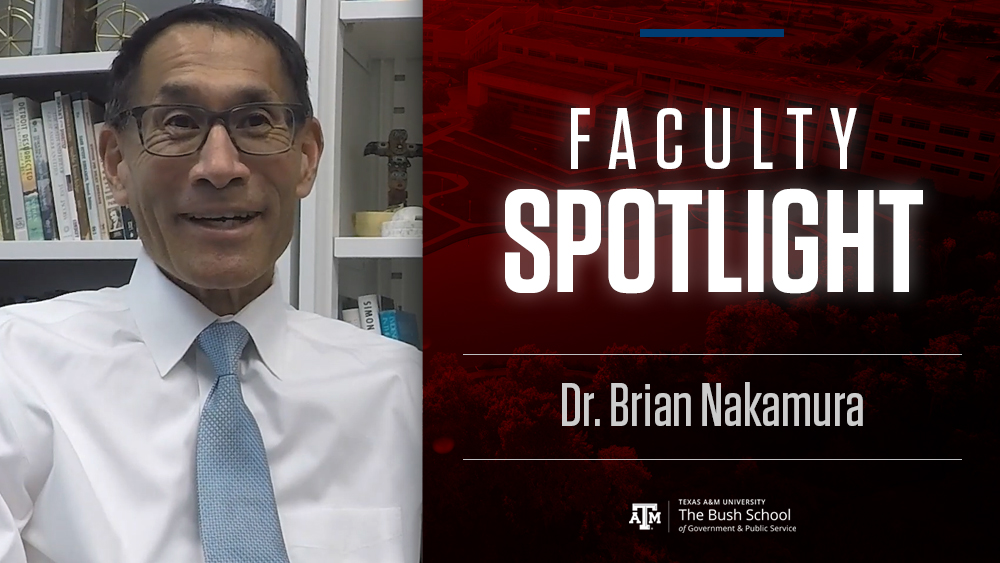
Dr. Brian Nakamura teaches public management and public policy program evaluation at the Bush School. He spoke about his research on state and local government in the context of US policy responses to the COVID-19 pandemic.
What research project/s do you currently have underway?
I’m working on what we call “coproduction of services” at the local government level. Essentially, coproduction of services for a local government is “how do we engage the citizens to be active and to participate within the environment in the community in which they live?” We want citizens to engage within the community beyond volunteering and participating in public meetings. We want them to engage in the production and implementation of essential public services.
For example, citizens tend to engage in Neighborhood Watch or community-oriented policing, and we want to take this one step further by having citizens truly engage, in a safe manner of course, in providing services related to economic development, social justice, and environmental protection. Let’s put the gloves on, get the shovels and trimmers out, and rid our parks and natural areas of invasive tree and plant species, as an example.
What are you hoping to learn through your research?
A lot of individuals want to participate [in local government], but they don’t know how or when it is appropriate. We hope to educate individuals on how they can become a more participatory person in the community to coproduce public services. And we want to better understand why there’s hesitancy and limited participation. But we also need to understand what methods of civic engagement and public participation will incentivize the community to become coproducers.
How could your research impact society?
What we learned over the last year and a half has really helped advance my research on coproduction. If you think about the pandemic, we continue to rely upon all levels of government to guide decision making on safety, jobs, housing, and all facets of life. Now we’re starting to look at how our citizens have reacted to government’s role throughout the pandemic, and what we’re finding is that the local level offers a more stable political environment, which favorably impacts a community. People concerned with government actions and activities at the national and state levels are more comfortable within the nonpartisan local government environment as they navigate modified and new norms attributed to public health, safety, and welfare, where the rules stay pretty consistent. We find that citizens rely upon local government because of stability during uncertain times.
Have you ever worked outside of academia? If so, what did you do, and how does it translate to your research and/or teaching?
I spent the first twenty-five years of my career working in local government. It goes back to what I dealt with serving at the local level, which is the frustration of making policy decisions for our community with very little input and participation from the community. It’s always been a goal of mine to determine what [the] underpinnings that prevent or limit people from actively participating in government are.
What research or teaching accomplishment are you most proud of?
Presenting the work that I’ve been doing at the American Society for Public Administration was most enjoyable, not necessarily for me but for all the people I’ve engaged with throughout the years—policymakers, fellow colleagues, and citizens. It’s been a great opportunity to draw upon their knowledge and experiences and put [those] into writing, presenting information and data to encourage and embrace efforts to construct a better society.
What do you like most about working at the Bush School?
The people. I always view intergenerational learning and thinking as most important, and we embrace this concept here at the Bush School. We have educators who want to build our quality of life at the international, federal, state, and local levels. To do so, we must think generationally, and we have brilliant intergenerational thinkers here at the Bush School.
What is your favorite class that you teach, and why?
Public management. Public management embraces critical thinking, and we need to be critical thinkers, ask why, be willing to share opinions but not be opinionated, and use good judgment without being judgmental. It’s the difficult conversations we need to have that facilitate growth and lifelong learning, thus allowing for adaptation and adjustment to our everchanging political, economic, and social environment.
If we’re intergenerational critical thinkers, we learn from those before us, grow from today’s experiences, and use our knowledge and experiences to improve our future. We think globally and act locally—great opportunities and advancements in the quality of life have roots locally, grow nationally, and blossom globally.